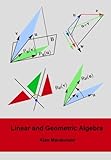Found in 2 comments on Hacker News
happy4crazy · 2011-04-13
· Original
thread
If you enjoy playing around with quaternions, you may also have fun with geometric algebra.
Geometric Algebra for Physicists is very clear and gently paced. http://www.amazon.com/Geometric-Algebra-Physicists-Chris-Dor...
This one also looks good: http://www.amazon.com/Linear-Geometric-Algebra-Alan-Macdonal...


Here are three great sources that helped me to understand GA:
1. https://www.amazon.co.uk/Geometric-Algebra-Computer-Science-...
2. https://www.amazon.co.uk/Linear-Geometric-Algebra-Alan-Macdo...
3. https://www.amazon.co.uk/Algebra-Graduate-Texts-Mathematics-... , pages 749-752
The first source gives great motivation and intuition for GA and its various products. Its mostly coordinate free approach is very refreshing and makes the subject feel exciting and magical. This is also the problem of the book, it's easy to end up confused and disoriented after working through it for a while. The second source is great because it grounds GA firmly on LA, and makes everything very clear and precise. The third source gives a short and concise definition of what a Clifford algebra is.